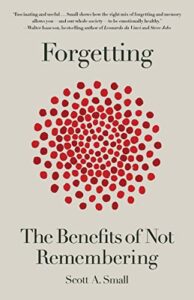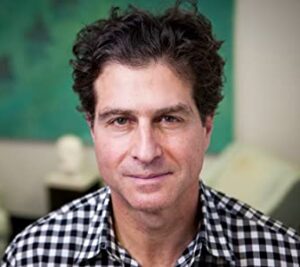In today’s world with the seemingly rampant acceleration of Alzheimer’s, it is hard not to go into a panic whenever anything slips someone’s mind. It’s understandable, especially as people age and have frightening and demoralizing encounters with individuals suffering from Alzheimer’s. But emerging research now indicates that not all forgetting is bad. In fact, “normal forgetting” may not only be part of our basic mechanics, it may help people let go of troubling and debilitating memories and help spur creativity and general wellbeing. Dr. Scott Small, author of Forgetting: The Benefits of Not Remembering, thinks so. He has spent his professional career helping in the battle against dementia and Alzheimer’s and he recently spoke with WellWell on the difference between normal and pathological forgetting and why it is so important to just let certain memories go.
What inspired you to write the book? Was it just a culmination of research?
I am a guy who’s committed his career to fix pathological forgetting and I end up writing a book on the benefits of normal forgetting. The interesting storyline is that throughout my education there’s always been this view that forgetting is the enemy. Memory is the hero. More memory, fight forgetting. And that’s certainly the case in pathological forgetting, the forgetting that happens in later life, in Alzheimer’s and disorders. What was so interesting to me and a shock to my system is this new neuroscience of normal forgetting. Forgetting, we’re all born with, we all have naturally, that’s what turned out to be interesting to me because it’s shown to be beneficial to the mind.
What’s the difference between pathological forgetting and normal or accepted forgetting?
Any simple forgetting is always simplified but yes, as a rule of thumb, pathological forgetting is any worsening in your memory that you’ve noticed over your baseline. We all have different kinds of memory and forgetting. But when that memory worsens over time, typically in our later years, that’s pathological by definition. Normal forgetting is forgetting we all have when we’re born, when we’re kids and when we were young adults; we all have forgetting. That’s not pathological, that’s normal, so that’s the simple description.
Why is normal forgetting good for you?
It turns out that we need our forgetting in balance with memory. That’s an important point. It’s not just now, suddenly forgetting is good and memories are bad, you need both in balance. The analogy given is like any engine, you need a braking system and an accelerator and if one or the other is off-kilter, bad things happen. So, it turns out that we need our forgetting to countervail our memory to think more clearly. Without forgetting, we wouldn’t be able to see the forest from the trees. We couldn’t generalize in a very complicated life. Without forgetting, the memory/forgetting balance would be off kilter with too much memory. That would make any pain we suffer, any painful event, remain painful in perpetuity. We would suffer from PTSD. We need the balance to keep our minds light and crave that balance to be able to make good decisions in a complicated world.
Is it fair to say that normal forgetting helps prevent a memory overload or something akin to that? 
So, there is some of that, just simply on overload. And this gets into the importance of sleep. Why did we sleep? Why do we spend a third of our lives in a very vulnerable position? One of the great mysteries. One of the answers that are emerging from the new science of forgetting is we sleep to smart forget, that’s the term we use. If you think about it, your brain is very thick and very happy to record everything that you’ve been exposed to throughout your daily activities. If you were to remember all that, you would normally go crazy. People who are sleep deprived are equivalent to what our psychiatry colleagues would call “manic”, “obsessive-compulsive”, and even suffering from hallucinations. These studies have been done, sadly. If you’re sleep-deprived, you can’t get rid of all the extraneous memories and you, to a certain extent, go crazy.
Are there other benefits for releasing some of these memories?
Yeah. I think the somewhat obvious benefits that are worth emphasizing are the benefits of our emotional methods. When I lecture, I often get the question from the marital services: “Dr. Small, I know you’re developing drugs for Alzheimer’s but if you develop a drug that accelerates forgetting, call me. My practice will become very successful.” Any married person, any person who has friends knows that if you can’t forgive, you can’t have any long-term relationships. You need to forget to forgive. You need to forget the emotional bite of the memory. That means letting go. That is the forgetting mechanism in your brain allowing you to let things go. So, I think that’s obvious. The less obvious stuff is how forgetting is important for creativity and decision-making. We need to forget information to be creative and to be better decision-makers.
In the book, you mentioned that a lot of this new thinking in terms of memory research came about in the last decade. Is that fair?
Yeah, that depends on when you start counting but certainly from 2010 to today, that’s when most of the research really began. As you know in biology there’s sort of drip here, drip there and suddenly there was this clear, coherent picture emerging. The most important findings that put that into context was showing that neurons in the brain have different mechanisms that are different than our memory bank. I think most people know cells have different machinery, there’s the machinery of the memory machines, what I call nanomachines in the book. That’s been known for a long time. It used to be thought that forgetting was a rusting of those nanomachines. The fundamental anchoring point of the book is the realization that our cells or neurons in our brains have a completely different set of nanomachines that are dedicated to forgetting. The second you see that you are then forced to wonder, “Wow, why would nature give us machines as memory machines and machines for forgetting, there must be some utility.” And it turns out there is.
Why did this research occur in the last decade?
That’s a really good question. I’m not sure, I have a clear answer on that except that it did start seeming apparent that some genes are linked to Autism and cause an inability to forget. So there was a confluence of findings from basic biology, computer science and some translational neurobiology where it almost suddenly converged and then there was this real collective sense that forgetting is distinct and beneficial.
What are the gaps in research memory that need to be addressed now?
I acknowledge the book to my patients because it taught me the distinction between the suffering of pathological forgetting versus normal forgetting. They’ve taught me to make that distinction. They’ve taught me that you can live a life with pathological forgetting, but we all want a cure for this horrible Alzheimer’s disease. There have been 30 years of science and finally, the field has moved into cautious optimism that we will find a meaningful drug. It’s not there yet. The reason for it, the justification for that cautious optimism emerges from the mechanics cliche. If you don’t know what’s fundamentally broken, you’ll never fix it, right? And it’s only now that the whole field collectively has identified key pathways in neurons that seem to be the main drivers of Alzheimer’s. Now we have that, there are reasons to believe that the biomedical industry will be able to find meaningful drugs.
Are there things beyond drugs and maybe sleep that people can do to promote normal forgetting for themselves?
There is, particularly on the point of healthy emotional forgetting. I wrote an op-ed for The New York Times on the second anniversary of COVID about why it’s important to forget our emotions. Not to forget the details. We should always remember the Alamo, always remember the details of COVID, but we need to be able to relax is on the emotional valence of what we all suffered because if not, we’re in perpetual pain and that’s not healthy. So, I think, an answer for your readers may be outlined in the PTSD chapter of my book. In there, PTSD investigators ask why when two people return from war or the same traumatic experience, one person develops PTSD, the other one doesn’t. What is causing emotional forgetting to break down so they can’t seem to let go. They can’t seem to forget. They suffer from PTSD. Of course, genes are involved and also the environment, but the strongest risk factor that I was told is that it comes from those who have lived in social isolation, and who are lonely. Those are the ones who suffer the inability to forget the most. This ties into some of the new neuroscience on forgetting. It turns out that when we all socialize, we all engage our forgetting mechanisms. And this was in essence the worry I voiced in The New York Times article. Think about it. COVID is a trauma, we’re all suffering it to a certain extent, and the double whammy there is that the recommendation for correct reasons is to socially isolate. And so, we suffered a trauma, we couldn’t engage our normal forgetting mechanisms because we couldn’t socialize and psychologists are expected to see a particular kind of Post-COVID PTSD because of that.
Is social interaction the same as a distraction?
No, it’s not a distraction. Social isolation is beneficial and in fact, therapeutic for a lot of reasons. Not everything needs to be simplified. There is a simple story when two people look into each other’s eyes, two people hug and laugh, and their brains release restorative hormones that induce fear of forgetting. That’s the proposed mechanism. It’s much more complicated than that. I’m not simplifying things but that is a very elegant reason why we need to socialize because it actively causes our brains to secrete restorative hormones that induce fear of forgetting.
Is this concept of useful or healthy forgetting a tough sell to people?
It’s only a tough sell with people for a second. If they sometimes for a second think that I’m, God forbid, poeticizing pathology, you know? There are some books where people write that “you have a medical disease but guess what, there’s a silver lining.” God forbid my book is like that. I am not saying that Alzheimer’s disease and the pathological forgetting of Alzheimer’s is good. I’ve seen it on my patients, it isn’t. That’s why I dedicate my life to finding a cure. But once they understand what normal forgetting is all about, it’s an easy sell because we all know that we need to let go. Most people find it compelling to be able to see the forest for the trees, to generalize on why it’s important for creativity, for our decision making. It’s a surprise maybe originally and it was a surprise to me, but the science is so clear. I hope the book is clear enough that no one really finds it ultimately unacceptable. It seems compelling to most to read the book and read the science.

About Dr. Scott Small
Dr. Scott A. Small is a physician specializing in aging and dementia and a professor of neurology and psychiatry at Columbia University, where he is the director of the Alzheimer’s Disease Research Center. Dr. Small has published more than 140 studies on memory function and malfunction, research that has been covered by The New York Times, The New Yorker, and Time. His insight into Alzheimer’s disease recently led to the formation of Retromer Therapeutics, a new biotechnology company that he co-founded.
Forgetting: The Benefits Of Not Remembering can be purchased at Amazon.










